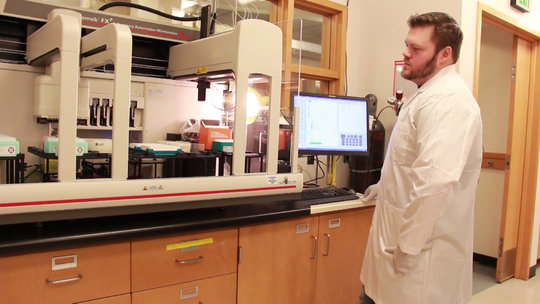You are here
Genes Influence How Mice React to Ebola, Study Says In ‘Significant Advance’
Primary tabs
NEW YORK TIMES Oct. 30, 2014
By Gina Kolata
Some people exposed to the Ebola virus quickly sicken and die. Others become gravely ill but recover, while still others only react mildly or are thought to be resistant to the virus. Now researchers working with mice have found that these laboratory animals, too, can have a range of responses to Ebola, and that in mice, the responses are determined by differences in genes.

Researchers at the University of Washington have been studying the Ebola virus in mice, and have found that the effects of the virus may be determined by genes.Video and photo by University of Washington.
This is the first time scientists have been able to breed mice that developed Ebola infections resembling those in humans complete with some puzzling features seen in people.
About two-thirds of people who die from Ebola never develop the terrifying hemorrhages that appear in others a day or two before death, in which eyes turn fiery red, gums bleed, red dots emerge on the skin as blood seeps out of capillaries, and blood appears in vomit and diarrhea. Many mice, too, die of Ebola without hemorrhages.
The mouse studies indicate the animals that hemorrhage and — by implication, humans— die because their immune systems overreact to the virus....
Although the investigators have not yet pinned down the exact genetic reasons that mice vary so much in their responses to the Ebola virus, they have identified two genes that seem to be crucial in determining if a mouse will die or whether the infected mouse will even become ill.
Link to full study
Science Magazine
http://www.sciencemag.org/content/early/2014/10/29/science.1259595.full



Recent Comments